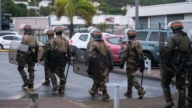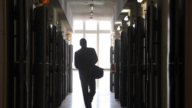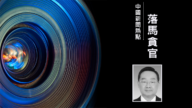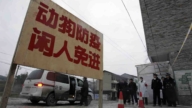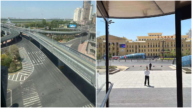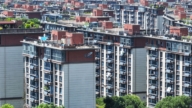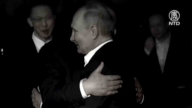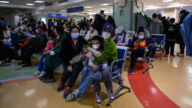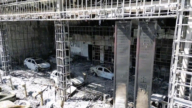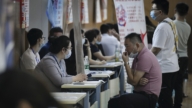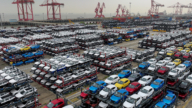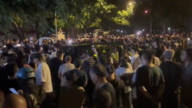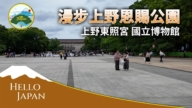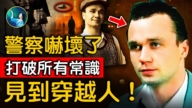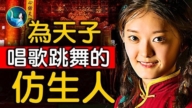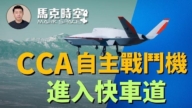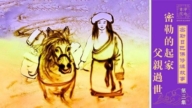【新唐人2014年12月03日訊】中共原新聞出版總署署長柳斌傑日前透露,由於新聞媒體發言隨意,讓管制嚴格的傳統媒體影響力減弱,全國人大正在研究對新聞傳播立法,讓媒體可以依法判斷自己的行為。不過有分析指出,中共這一做法是因為面對的壓力有所加大,但在現有政治體制下,即使立了法,也是一個任由中共解釋,受中共操控的法律,無法真正依法行事。
11月26號,中共全國人大常委、原新聞出版總署署長柳斌傑表示,新媒體發言隨意,吸引眼球﹔傳統媒體管制嚴格,面容呆板,一樣傳播兩個尺度,讓傳統媒體常常感嘆「帶著鐐銬跳舞」、環境不公,而傳播立法的出臺,可以終結這一局面。
柳斌傑還說,新聞傳播也要有法治思維,否則,底線不清、邊界不明,媒體不好把握。傳播立法能使媒體獲得自主權,媒體可依法行使法律賦予的職權,依法判斷自己的行為。
原陝西電視臺記者馬曉明:「現在社會上媒體人、新聞界,在新聞立法呼聲很高,已經呼籲了很多年了,為了應對這種呼聲,再一個,中共自己也說要依法治國,新聞不立法,無法可依,中共自己也感到社會壓力比較重,總的來說,他們的意圖就是為了應付社會的壓力。」
英國廣播公司《BBC》指出,早在20世紀80年代,《新聞法》就曾被提上中國立法議程,但1989年6月發生了天安門學生民主運動,新聞立法工作也因此停頓。
原河北人民廣播電臺編輯朱欣欣:「長期以來不搞新聞立法,就是它想給自己留一個掌控新聞界的一個空間,它立法以後,恐怕束手束腳。」
曾在中國政法大學任教的美國哈佛大學訪問學者滕彪,向《自由亞洲電臺》表示,關於新聞立法,大陸學界和知識界一直有兩種不同的聲音。一種認為應該立法,否則都是中宣部、新聞出版署等通過一些命令來規定;另一種聲音認為不應該立法,因為在政治體制不變的情況下,如果立法,一定是限制新聞自由、對媒體記者約束很大的一個法律。
滕彪表示自己比較認同「立法可能會更大程度限制中國新聞自由」這一觀點。
馬曉明:「一黨獨裁的環境如果不打破的話,不要說是不可能,不會立新聞法,就是立了新聞法,也是一個管控,可以任由他們解釋的一種法。這個裁決、執行的權力,它是受到黨的控制的,它還是不能夠依法行事的。」
朱欣欣:「從根本上,從大的方面來講,它肯定還是受黨權的控制,從常規的情況下來講,它可能要促進法規化、法制化,專制制度的法制化,使控制更加系統嚴密,更加規範。」
滕彪認為,新聞傳播立法唯一積極的意義在於,當黨政部門對媒體或新聞從業人員的要求和處分,明顯違背新聞傳播法時,媒體或新聞從業人員可以依法抗辯。不過,他也認為,在目前的法律體制下,媒體或記者很難有效抗辯,更難以改變當局的決定。
滕彪說,中共在1990年推出的「集會遊行示威法」,就是一個限制、禁止集會遊行示威的法律。這是一個前車之鑑。
原河北人民廣播電臺編輯朱欣欣對於這次的新聞傳播立法,表示不樂觀。
朱欣欣:「現在只能希望先一步步來吧,在一些小的事情上,枝節的事情上,有法可依,畢竟你沒有法律,各級的官員隨意的用權力來指揮來控制要好一些,但從根本上來講,我對這個新的立法不抱樂觀。」
據了解,中共今年出臺了一系列關於新聞和傳媒機構的法規條文。6月18號,中共廣電總局下發通報,禁止新聞記者和記者站私自開展批評報導。
10月29號,中共國家互聯網信息辦公室和廣電總局聯合下發通知,要求在大陸新聞網站推行「新聞記者證」制度,把所有新聞網站採編人員納入統一管理。
「六四天網」負責人黃琦曾向《新唐人》表示,中共當局採取這一系列方法,主要是為了遏阻網路輿論的傳播,以及民眾對貪污、腐敗、征地、拆遷等問題的投訴。
採訪/李韻 編輯/陳潔 後製/鍾元
The CCP Proposes Legislation To Regulate News Media Due To High Pressure
Mr. Liu Bin, former Director of Press and Publication
of the Chinese Communist Party (CCP), has revealed that
the effects of tightly controlling the traditional media
have weakened.
Modern media allows netizens to speak freely,
thus the National People’s Congress (NPC) is preparing
for legislation on the news media, so that the media
can judge their own behaviour according to the law.
Analysts pointed out that this approach was due to the CCP
facing increasing pressure.
But under the current political system, even if the legislation
passes, the law is still discretionarily explained
and manipulated by the CCP, and it is impossible
to really rule by the law.
On Nov. 26, Mr. Liu Bin, a NPC Standing Committee member
and former Director of Press and Publication, said that
the new media allows free speech to attract attention,
whereas traditional media is strictly controlled.
Both styles spread in the same market but
with two different censorship degrees.
This makes traditional media often sigh and feel
as if they are “dancing with shackles."
This is an unfair censorship environment.
The legislation on the spread of the media
will end this situation.
Mr. Liu said that the news media should rule by law
otherwise the unclear censorship bottom line
and the unknown boundary make the media difficult
to control themselves.
The media legislation will enable media to have
decision-making power, and the media can exercise power
authorised by law, and judge their actions according
to the law.
Mr. Ma Xiaoming, former Shaanxi TV reporter: “At present,
media professionals and the press circles have loudly called
for media legislation for many years, so the CCP is replying
to such an appeal.
On the other hand, the CCP has also vowed
to execute the rule by law.
If the news media is not legislated, then there is no law
to rule, and the CCP feels relatively heavy social pressure.
In general, their intention is to cope with
the societal pressures."
British Broadcasting Corporation (BBC) pointed out that
as early as the 1980s, the Press Act would have been put
on the Chinese legislative agenda, but the Tiananmen
Student Democracy Movement took place in June 1989.
Therefore the press legislation halted.
Former Editor of Hebei Province People’s Radio Zhu Xinxin:
“The press legislation has long not been carried out so that
the CCP could have room to control the press circles.
Their legislation might be binding their own hands and feet."
Mr. Teng Biao, a visiting scholar of Harvard University who
used to teach at China University of Political Science, told
Radio Free Asia that regarding press legislation, mainland
academics and intellectuals have two differing voices.
One voice believes there should be legislation,
otherwise the Central Propaganda Department
and Press and Publication Administration issue
some provisions to regulate the field.
The other voice thinks there should not be legislature
because under the current unchanged political system,
if legislation passes, then it will restrict press freedom
and be a law largely constraining the media reporters.
Teng Biao said he more agree the saying “legislation may
lead to greater restrictions on Chinese press freedom."
Ma Xiaoming: “If the one-party dictatorship environment
cannot be broken, please do not say it is impossible
to or does not develop the press legislation.
Even if the legislation passes, it is still censorship and control,
and the law can be discretionarily explained by them.
Such an adjudication and execution right is controlled
by the CCP, and this is still not able to act according to law."
Zhu Xinxin: “Fundamentally, from the macro level,
it is certainly still under the control of the CCP.
From the normal situation, this may promote legislation
and legalization, and this is a legalization for autocracy.
So the censorship becomes a more rigorous control system,
and it is more standardized."
Teng Biao believes that the only positive significance
of the legislation is that when the CCP and government
departments require punishment of media or journalists
who clearly violate the news media law, then the media
or journalists can defend themselves by the law.
However, he also believes that under the current legal
system, media or reporters have difficulty to effectively
defend themselves, and more difficulty changing
the decision of the authorities.
Teng Biao said that the CCP launched the Act on Assemblies,
Processions and Demonstrations in 1990.
It is a law restricting and prohibiting assembly,
procession and demonstrations.
This is a past lesson and warning.
Zhu Xinxin is not optimistic regarding
legislation on news media.
Zhu Xinxin: “The current situation can be only
to follow step by step.
On some small and trivial matters there are laws.
After all, if there is no law, the officials across all levels
use their powers to discretionarily command
and control the situation, this should be better.
But fundamentally, I am not optimistic
about such a new legislation."
It is understood that the CCP introduced a series of laws
and provisions on news and media agencies this year.
On June 18, the CCP State Administration of Press,
Publication, Radio, Film and Television of the PRC (SARFT)
issued a notification prohibiting news reporters
and correspondents from privately reporting with criticism.
On Oct. 29, the CCP Station Internet Information Office
and the SARFT jointly issued a notice requiring
the implementation of the “news correspondent certificate"
system in the news websites and uniform management
of all journalists and editorial staff of the news sites.
Tianwang head Huang Qi once told NTD that the series
of actions by Chinese authorities is mainly in order to curb
the spread public opinion via the internet regarding
public complaints of embezzlement, corruption,
land acquisition, demolition and other issues.
Interview/LiYun Edit/ChenJie Post-Production/ZhongYuan


